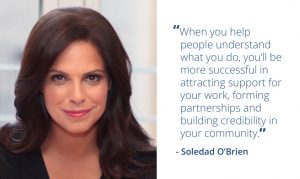Journalist Soledad O’Brien: How to Tell Better Stories
de Beaumont Foundation October 24, 2018

 One thing I’ve learned over the years about storytelling is that it is as much about people as facts. Facts make your case, they convey information, they give credibility and heft to your reporting. What they don’t always do is make you want to know more.
One thing I’ve learned over the years about storytelling is that it is as much about people as facts. Facts make your case, they convey information, they give credibility and heft to your reporting. What they don’t always do is make you want to know more.
For public health leaders who are trying to convey the importance and successes of public health, this is an important lesson. The narrative of public health is complicated. Public health involves every element that allows us to live in society — housing, access to food, daily stresses, the environment, and more.
The best way to tell that story is through the eyes of people, not by leading with complicated lessons on the “social determinants of health.” (When I hear that term, I think, “What the heck does that mean to anybody outside of public health?”) People are the ones experiencing the benefits of public health in life-transforming ways — the family that escaped the fire because of the smoke detector, the hospital staff that kept functioning after the hurricane because the generator was on the roof, the kids who were spared the deadly flu because of a vaccine. Then you can get into the equally important details of how and why things happen.
I was recently invited to address a group of public health officials about the power of storytelling. People spoke up about the many challenges they face when telling the story of the public health’s impact. When public health is going well, it disappears from the media landscape. When there is a water crisis or a flu epidemic, it comes roaring back. You can help change that by helping people understand the role you and your colleagues play in addressing these crises and preventing the next one. You can be the real-life story behind the public health triumphs that improve and save lives.
When you help people understand what you do, you’ll be more successful in attracting support for your work, forming partnerships and building credibility in your community. That’s where stories come in, whether you’re talking to community leaders, business executives, elected officials, or the media. More than statistics or infographics, good stories trigger understanding and empathy — which is more likely to drive action and change behavior.
Public health leaders have an opportunity to take the same approach to build support for their important work. Here are a few guidelines:
Focus on solutions, not problems.
Instead of framing problems as problems, frame them as solutions. At my company Starfish Media Group, we explore race, class, wealth, opportunity, and poverty, which can be divisive issues, and we find it more effective to present successful solutions instead of “raising awareness” about problems.
Lead with people, not data.
Many health professionals, researchers, and scientists don’t like to hear this, but good stories aren’t about data. The best stories give us data without us actually realizing we’re receiving data. Your work is about the people whose lives you impact every day. Tell their stories.
Brainstorm with your staff and partners.
Try to identify five things that make you think: “That story rips your heart out. Let’s go tell that one.” And when you have a few ideas, tell those stories to people who aren’t in your profession — your spouse, your kids, your friends — and see what they think. If other people don’t understand your story or don’t care, keep looking.
Focus on individuals.
Instead of sharing statistics about asthma, for example, show your audience what it’s like to live with asthma. What happens at school? At recess? At home? A story about a condition like asthma is often a story about poverty, or lack of access to proper care, or about the inability of a single parent to juggle the needs of multiple children.
Don’t be shy.
I’ve been so impressed with the public health professionals I’ve met around the country, and I think they are sometimes too humble about the important work they do and the impact they have on people’s lives. Don’t be shy. Figure out what your story is, and push it out constantly. Maybe your narrative can be: “We are in the trenches every day, and we save lives.”
Soledad O’Brien is an award-winning journalist, documentarian, news anchor, and producer. She is the founder and CEO of Starfish Media Group and an executive producer of the What Works Media Project. She hosts the weekly political magazine show “Matter of Fact” on Hearst networks. She also serves on the advisory committee for the de Beaumont Foundation’s initiative PHRASES (Public Health Reaching Across Sectors).
This was first published on the APHA Annual Meeting blog as part of the de Beaumont Foundation’s “Fresh Perspectives” series.